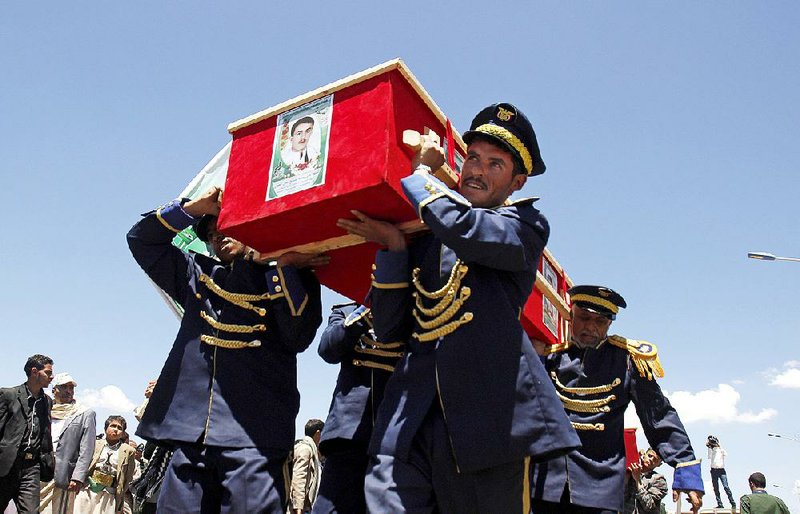SANAA, Yemen -- Saudi Arabia began airstrikes Wednesday against Houthi rebel positions in Yemen, vowing that the Sunni kingdom will do "anything necessary" to restore the deposed government, and the White House said the U.S. had provided logistical and intelligence support to the military operation.
The moves came hours after Yemeni President Abed Rabbo Mansour Hadi fled the country by sea as the Shiite rebels and their allies advanced on the southern port city of Aden where he had taken refuge. The rebels also captured his defense minister and seized the city's airport.
Hadi's departure means a decisive collapse of what was left of his rule, which the United States and Persian Gulf allies had hoped could stabilize the chronically chaotic nation and fight al-Qaida's Yemen branch after the 2011 ouster of longtime autocrat Ali Abdullah Saleh.
Over the past year, the Shiite rebels known as Houthis, who are believed to be supported by Iran, have battled their way out of their northern strongholds, overwhelmed the capital, seized province after province in the north and worked their way south. The Houthis deny they are backed by Iran.
Their advance was boosted by units of the military and security forces that remained loyal to Saleh, who allied with the rebels.
After the Houthis overran the capital, Sanaa, in September, Hadi remained in office, but then was put under house arrest. He fled the capital in early March with remnants of his government and declared Aden his temporary capital.
Hadi and his aides left Aden after 3:30 p.m. Wednesday on two boats, security and port officials said. The officials would not specify his destination.
The Houthis said later Wednesday that Saudi jets were hitting a military base under rebel control in Sanaa. The rebels said they fired anti-aircraft missiles in response.
Saudi Arabia's ambassador to the United States, Adel al-Jubeir, announced the airstrikes against the Houthis at a Washington news conference. He said his government had consulted closely with the U.S. and other allies, but said the U.S. military was not directly involved in the operations.
Al-Jubeir said nine other countries had joined a military coalition to fight the Houthis, but he declined to name them.
Five members of the Gulf Cooperation Council -- Saudi Arabia, United Arab Emirates, Kuwait, Qatar and Bahrain -- issued a statement saying they are answering the demands to intervene in Yemen militarily. Oman, the sixth member of the council, didn't sign on. In a separate statement, Egypt announced its political and military support.
Al-Jubeir recounted a series of diplomatic efforts to dissuade the Houthis from continuing their offensive. But, he said, they "have always chosen the path of violence."
"Having Yemen fail cannot be an option for us or our coalition partners," al-Jubeir said.
Arab leaders are meeting in Egypt this weekend for a planned summit, which is now likely to be dominated by the developments in Yemen.
Hadi on Tuesday had asked the United Nations Security Council to authorize a military intervention "to protect Yemen and to deter the Houthi aggression" in Aden and the rest of the south. In his letter, Hadi said he also asked members of the Gulf Cooperation Council and the Arab League for immediate help.
Hadi fled Wednesday after Houthis and Saleh loyalists advanced against his allies on multiple fronts.
In the province of Lahj, adjoining Aden, the rebels captured Hadi's defense minister, Maj. Gen. Mahmoud al-Subaihi, and his top aide Wednesday and subsequently transferred them to Sanaa. Yemen's state TV, controlled by the Houthis, announced a bounty of nearly $100,000 for Hadi's capture.
Hadi then fled his presidential palace. Soon after, warplanes targeted presidential forces guarding it. No casualties were reported. By midday, Aden's airport fell into the hands of Saleh's forces after clashes with pro-Hadi militias.
Earlier in the day, the rebels seized a key air base where U.S. troops and Europeans had advised the country in its fight against al-Qaida militants. The base is about 35 miles from Aden.
Yemen's Al-Masirah TV reported that the Houthis and allied fighters had "secured" the al-Annad air base, the country's largest. It claimed the base had been looted by both al-Qaida fighters and troops loyal to Hadi.
The U.S. recently evacuated some 100 soldiers, including special forces commandos, from the base after al-Qaida briefly seized a nearby city. Britain also evacuated soldiers.
The base was crucial in the U.S. drone campaign against al-Qaida's Yemen branch, which Washington considers to be the most dangerous offshoot of the terrorist group. It has claimed the attack on the French satirical magazine Charlie Hebdo in Paris, in addition to failed bombing attempts in the U.S.
U.S. operations against the militants have been scaled back dramatically in Yemen's chaos. U.S. officials have said CIA drone strikes will continue in the country, though there will be fewer of them. The agency's ability to collect intelligence inside Yemen, while not completely gone, is also much diminished.
Information for this article was contributed by Ken Dilanian, Maggie Michael, Sarah El Deeb and staff members of The Associated Press.
A Section on 03/26/2015
